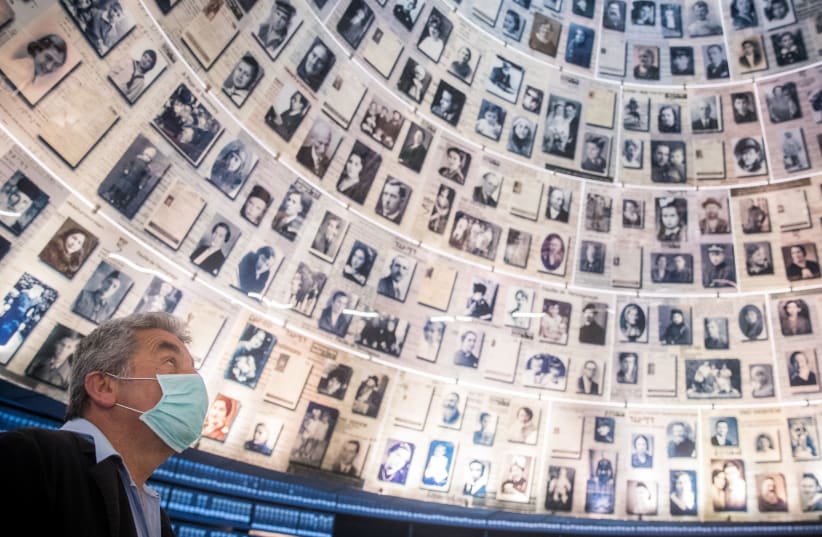Despite Yad Vashem’s Warsaw Ghetto Square being eerily deserted, the Holocaust Martyrs’ and Heroes’ Remembrance Day ceremony nevertheless went ahead in perhaps the strangest circumstances of the country’s history.
In the shadow of the coronavirus epidemic, the host of the ceremony addressed an empty square and vocalists performed without an audience – but the speeches from the country’s leaders, the stories of survivors and the prayers for those murdered all went ahead regardless.
Speaking via video, Prime Minister Benjamin Netanyahu said that the fight against the coronavirus outbreak was perhaps the biggest global crisis since the end of the Second World War.
He noted that during the Holocaust, multitudes of Jews died from disease due to the inhuman conditions imposed upon them by the Nazis, but said that although Israelis face today another contagion, the circumstances could not be more different.
“Today we have a national home, we have our own country. A strong, advanced country which is much appreciated,” said Netanyahu.
He noted that earlier this year, the country had hosted many world leaders at Yad Vashem to commemorate the liberation of Auschwitz and pledge to fight antisemitism, saying that they had been impressed with the Jewish’s states success in “replacing helplessness with power and mighty accomplishments.”
As is wont on Holocaust Remembrance Day, Netanyahu raised the spectre of ongoing threats to the safety of the Jewish people, including “radical Islam led by Iran,” which he said would not dissipate in the coronavirus crisis.
President Reuven Rivlin also delivered a recorded address, saying that the coronavirus pandemic and its attendant difficulties should not cloud out the memory of the past.
“We must remember! We remember! We will continue to remember! For our own sakes, and for future generations,” said the president.
“Even in these difficult times, when we are confronting a global pandemic and the current sense of anxiety, we hear and make place for remembering the past, the victims and you, the survivors. You, who survived humanity’s darkest hour. A catastrophe brought by humans on humans.”
Traditionally at the Holocaust Memorial Day ceremony, six Holocaust survivors light the torches at Warsaw Ghetto Square in Yad Vashem and then speak about their experiences during those cataclysmic times.
Zohar Arnon, from Hungary, was supposed to be one of this year’s lighters. Born in 1928, Arnon was one of five children. By the time the Second World War broke out, he was already a member of the Zionist Hashomer Hatzair (Youth Guard) movement.
After the Nazis occupied Budapest in March 1944, deportations to death and concentration camps began in May. Some 430,000 Hungarian Jews were deported, mostly to Auschwitz, where the majority were sent to the gas chambers upon arrival.
Zohar however, related in a recorded account of his story that at the age of just 16 he met up with his Hashomer Hatzair group leader, who was also a member of the underground Zionist movement in Budapest, which provided thousands of young Jews with false papers and smuggled them into Romania.
He was sent by rail towards a town on the Hungarian border with Romania and subsequently smuggled into that country, and then on through Bulgaria, Greece, Turkey, Syria and Lebanon, finally arriving in Mandate Palestine in January 1945.
Ahead of the commencement of Holocaust Martyrs’ and Heroes’ Remembrance Day, the Finance Ministry released details pertaining to Holocaust survivors living in Israel today.
According to the ministry, there are approximately 189,500 survivors living in the country, 77% of whom are over 80.
The average age of Holocaust survivors is 83.9, the ministry stated, and 15,170 of them passed away over the last year.
Some 16% of survivors in Israel are over 90, and 800 are centenarians. Some 60% of survivors are women.
Yad Vashem and the Next Generation Association will be screening a special commemorative program on Tuesday at 11 a.m. via YouTube and 6 p.m. via Facebook and YouTube. People will be asked to “comment” throughout the event, sharing the names of family members that perished in the Holocaust.
As part of the online event, a virtual candle will be lit by six successive generations of individuals or representatives of underground and partisan groups who worked to save people during the Holocaust. In addition, personal stories will be recounted by survivors, and second-generation survivors will light a virtual candle in honor of those who were killed.
In addition, Yad Vashem, in partnership with Cellcom TV, launched a testimonial television channel for Holocaust survivors on Monday. The channel will run for 48 hours and will broadcast the recordings of personal stories of numerous survivors that have been captured over the past years.
The Zikaron Basalon (Memorial in the Living Room) project, which in the past would see millions of families in 54 countries hosting Holocaust victims or their families in their homes to share their stories, has also gone online. The organization’s website contains discussion kits, including instructions on how to hold a Zoom meeting with one's grandparents or Holocaust survivors.
Also on the eve of Holocaust Remembrance Day, the Jewish Agency hosted a virtual event in eight languages and at two different times on their Facebook page.
The event centered on the story of Holocaust survivor Leah Hason, who was four years old when her father was taken to a concentration camp and murdered. She and her mother managed to escape the Jewish ghettos and hid in both a pig barn and desolate forests until the War was over. They were finally rescued by the Russian army in 1945. Hason and her mother then spent three years as refugees until they were finally able to make aliyah in 1948 and settle in Kibbutz Mizra in northern Israel.
At the end of the program, different Jewish Agency emissaries held virtual discussions about the story.
